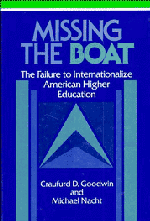Book contents
- Frontmatter
- Contents
- Introduction
- 1 Higher education looks abroad: historical trends
- 2 Who goes today? and who does not?
- 3 Individual costs and benefits
- 4 Campus attitudes
- 5 Obstacles to international experience
- 6 Issues for debate
- 7 Cases studies
- 8 Epilogue: missing the boat
- Appendix: institutions visited
- Index
8 - Epilogue: missing the boat
Published online by Cambridge University Press: 04 August 2010
- Frontmatter
- Contents
- Introduction
- 1 Higher education looks abroad: historical trends
- 2 Who goes today? and who does not?
- 3 Individual costs and benefits
- 4 Campus attitudes
- 5 Obstacles to international experience
- 6 Issues for debate
- 7 Cases studies
- 8 Epilogue: missing the boat
- Appendix: institutions visited
- Index
Summary
Conditions facing U.S. academe
We have discussed how pressures emerged after World War II for U.S. higher education to internationalize itself. Our institutions responded fairly well to these challenges. The first challenge grew out of the United States' new-found role as “leader of the free world.” If the United States was to contain communism abroad and assist new nations to evolve with democratic governments and free market economies, the American people had to understand both a great deal about friend and foe and much about the world system that was being reconstructed from the ashes of empires. This new need for international understanding manifested itself on campuses in two ways. First, demands were made for area and international studies programs by students and faculty who felt a passionate concern for these subjects and a career commitment to understand them better. Second, requests and financial support came from the federal government and foundations and to a lesser extent from corporations to assist through programs oriented to national intelligence, public diplomacy, public understanding, development assistance, and international business. Colleges and universities responded by establishing area studies centers, international affairs schools and programs, internationally oriented courses in some professional fields, and commitments (especially at land-grant universities) to participate in development assistance programs overseas.
The net effect of the academic response to the perceived needs for global understanding was the creation of internationally sophisticated enclaves, mainly in the social sciences and humanities and parts of the professional schools.
- Type
- Chapter
- Information
- Missing the BoatThe Failure to Internationalize American Higher Education, pp. 110 - 121Publisher: Cambridge University PressPrint publication year: 1991



